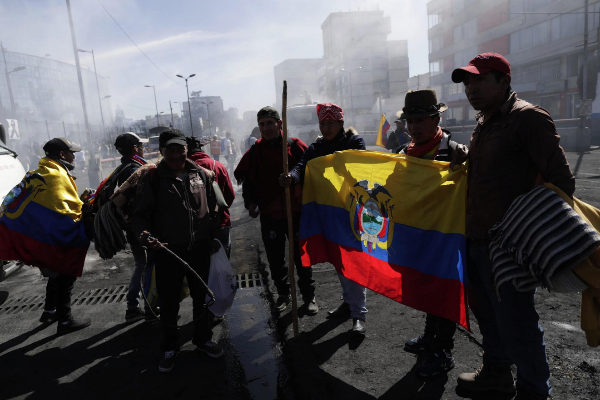- Agreement: Lenin Moreno and the indigenous leaders find a joint solution to the Ecuador crisis
- América.Carrera against the clock to reach an agreement in Ecuador
- Protests.The Army takes advantage of the curfew to regain control of downtown Quito
The 'in extremis' agreement reached between Lenín Moreno and the indigenous leadership has ended almost instantaneously with the yoke that threatened to suffocate the country and bring down the president himself. The chaos, repression and paralysis that subjugated Ecuador for 11 days have disappeared immediately, as if by magic. "In the next few hours I will repeal the 'Decree 883'. We have made a choice for peace. A new decree will be issued to ensure that resources reach those who really need them," Moreno said Monday through his social networks .
The decree that eliminated subsidies for extra gasoline and diesel thus goes to a better life, as demanded by the leaders of the Confederation of Indigenous Nationalities (Conaie). Something that had become a matter of honor, almost life or death. The claim has been accepted after two hours of negotiation because the president had no other way to restore normalcy.
Of course, it has also reached the indigenous commitment to seek in the coming hours the adequate mechanisms so that the money that can be saved benefits the poorest, the peasants, and not the drug gangs and smuggling. According to government studies, of the annual investment of 1.4 billion dollars to reduce the price of fuel, between 400 and 500 fell into the possession of organized crime.
Moreno's three mistakes were not to previously agree on the details of the investment and not measure the damage to the pockets of the humblest, who threw themselves into the street owned by reason. But the progressive leader also did not measure the destabilization capacity of his 'correístas' enemies, who with constant skirmishes put the police and military forces in check. The actions of government agents, sometimes disproportionate, have drawn criticism from all human rights organizations.
The peace with the natives has not meant, much less, the cessation of hostilities against whom the Government assures have instigated the violence and the semi-destruction of the headquarters of the Comptroller, symbol of the fight against corruption of the Correa decade and where they guarded the evidence of the processes that follow against the leader of the Citizen Revolution. Several of his fundamental collaborators were arrested, such as Paola Pabón, governor of Pichincha, and Virgilio Hernández. The last time Correa, a fugitive from the refugee Justice in Belgium, was reunited with them was in Caracas, under the protective mantle of Nicolás Maduro.
"I am not afraid of them, they entered, they broke the doors," Pabón denounced while transmitting his detention through Facebook. "Keep a finished government in blood and fire. These are no longer national orders, but from the north. Ecuador is 'beachhead'," Correa defended through Twitter, while listing the US attacks on revolutions, since the "delivery of Assange (founder of Wikileaks) to the destruction of Unasur and the attacks on Venezuela". Maduro, from Caracas, welcomed the "historic victory of the Ecuadorian people against the IMF."
According to the criteria of The Trust Project
Know more- Ecuador
- Venezuela
- Nicolás Maduro
- Lenin Moreno
- America
International Moreno Moreno leaves Quito in the face of indigenous pressure and accuses Correa and Maduro of attempted coup
Wide AngleA balance of blocks in Latin America
Latin America The Army takes advantage of the curfew to regain control of downtown Quito

